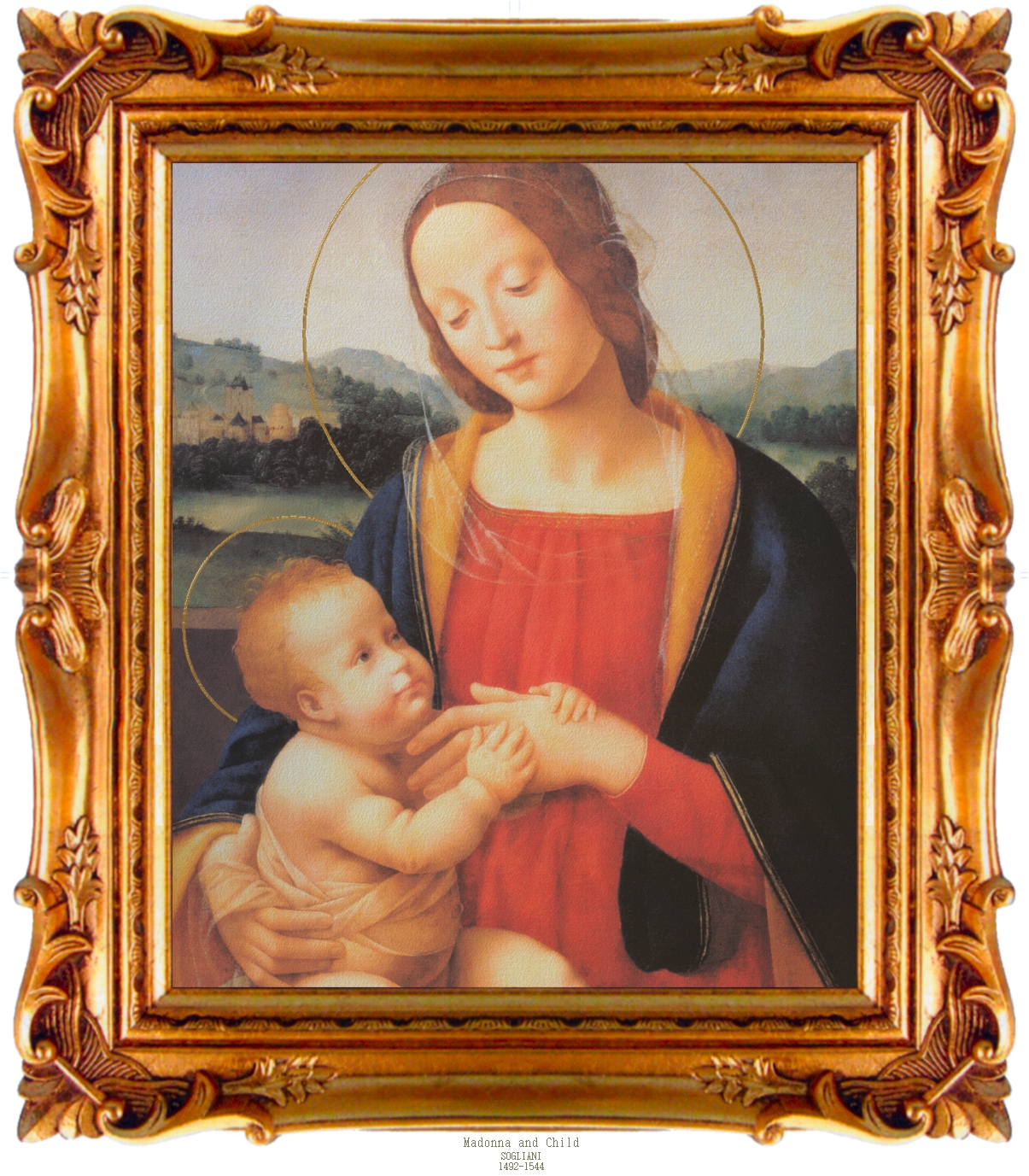


Excerpt From
The Glories of Mary
St. Alphonsus de Liguori
Redemptorist Fathers, 1931
with Nihil Obstat and Imprimatur
Published on the Web with Permission
Mary, Our Life, Our Sweetness
I. Mary is our Life, Because She Obtains for Us the Pardon of our Sins.
To understand why the holy Church makes us call Mary our life we must know, that as the soul gives life to the body so does Divine grace give life to the soul; for a soul without grace has the name of being alive, but is in truth dead, as it was said of one in the Apocalypse, "Thou hast the name of being alive, and thou art dead." [Apoc. 3:1] Mary, then, in obtaining this grace for sinners by her intercession, thus restores them to life.
See how the Church makes her speak, applying to her the following words of Proverbs: "They that in the morning early watch for me shall find me." [Prov. 8:17] They who are diligent in having recourse to me in the morning, that is, as soon as they can, will most certainly find me. In the Septuagint the words "shall find me" are rendered "shall find grace." So that to have recourse to Mary is the same thing as to find the grace of God. A little further on she says, "He that shall find me shall find life, and shall have salvation from the Lord." "Listen," exclaims St. Bonaventure on these words, "listen, all you who desire the kingdom of God; honor the most blessed Virgin Mary and you will find life and eternal salvation."
St. Bernardine of Siena says, that if God did not destroy man after his first sin, it was on account of His singular love for this holy Virgin, who was destined to be born of this race. And the Saint adds, "that he has no doubt but that all the mercies granted by God under the Old Dispensation were granted only in consideration of this most blessed Lady."
Hence St. Bernard was right in exhorting us "to seek for grace, and to seek it by Mary"; meaning, that if we have had the misfortune to lose the grace of God, we should seek to recover it, but we should do so through Mary; for though we may have lost it, she has found it; and hence the Saint calls her " the finder of grace." The Angel Gabriel expressly declared this for our consolation, when he saluted the Blessed Virgin saying " Fear not, Mary, thou hast found grace." [Luke 1:30] But if Mary had never been deprived of grace, how could the Archangel say that she had then found it? A thing may be found by a person who did not previously possess it; but we are told by the same Archangel that the Blessed Virgin was always with God, always in grace, nay, full of grace. "Hail, full of grace, the Lord is with thee." Since Mary, then, did not find grace for herself, she being always full of it, for whom did she find it? Cardinal Hugo, in his commentary on the above text, replies that she found it for sinners who had lost it. "Let sinners, then," says this devout writer, "who by their crimes have lost grace, address themselves to the Blessed Virgin, for with her they will surely find it; let them humbly salute her, and say with confidence, "Lady, that which has been found must be restored to him who has lost it; restore us, therefore, our property which thou hast found." On this subject, Richard of St. Laurence concludes, "that if we hope to receive the grace of God, we must go to Mary, who has found it, and finds it always." And as she always was and always will be dear to God, if we have recourse to her we shall certainly succeed.
Again, Mary says, in the eighth chapter of the sacred Canticles, that God has placed her in the world to be our defense: "I am a wall: and my breasts are as a tower." [Cant. 8:10] And she is truly made a mediatress of peace between sinners and God; " Since I am become in His presence as one finding peace." On these words St. Bernard encourages sinners, saying, "Go to this Mother of Mercy, and show her the wounds which thy sins have left on thy soul; then will she certainly entreat her Son, by the breasts that gave Him suck, to pardon thee all. And this Divine Son, Who loves her so tenderly, will most certainly grant her petition." In this sense it is that the holy Church, in her almost daily prayer, calls upon us to beg Our Lord to grant us the powerful help of the intercession of Mary to rise from our sins: "Grant Thy help to our weakness, a most merciful God; and that we who are mindful of the holy Mother of God, may by the help of her intercession rise from our iniquities."
With reason, then, does St. Laurence Justinian call her "the hope of malefactors," since she alone is the one who obtains them pardon from God. With reason does St. Bernard call her "the sinners' ladder," since she, the most compassionate Queen, extending her hand to them, draws them from an abyss of sin, and enables them to ascend to God. With reason does an ancient writer call her "the only hope of sinners," for by her help alone can we hope for the remission of our sins.
St. John Chrysostom also says "that sinners receive pardon by the intercession of Mary alone." And therefore the Saint, in the name of all sinners, thus addresses her: "Hail, Mother of God and of us all, 'heaven,' where God dwells, 'throne,' from which our Lord dispenses all grace, 'fair daughter, Virgin, honor, glory, and firmament of our Church,' assiduously pray to Jesus that in the day of judgment we may find mercy through thee, and receive the reward prepared by God for those who love Him."
With reason, finally, is Mary called, in the words of the sacred Canticles, the dawn: "Who is she that cometh forth as the morning rising?" [Cant. 6:9] Yes, says Pope Innocent III, "for as the dawn is the end of night, and the beginning of day, well may the Blessed Virgin Mary, who was the end of vices, be called the dawn of day." [In Assumpt. s. 2] "When devotion towards Mary begins in a soul it produces the same effect that the birth of this most holy Virgin produced in the world. It puts an end to the night of sin, and leads the soul into the path of virtue. Therefore, St. Germanus says, "O Mother of God, thy protection never ceases, thy intercession is life, and thy patronage never fails." And in a sermon the same Saint says that to pronounce the name of Mary with affection is a sign of life in the soul, or at least that life will soon return there.
We read in the Gospel of St. Luke [1:48] that Mary said, "Behold, from henceforth all generations shall call me blessed." "Yes, my Lady," exclaims St. Bernard, "all generations shall call thee blessed, for thou hast begotten life and glory for all generations of men." For this cause all men shall call thee blessed, for all thy servants obtain through thee the life of grace and eternal glory. "In thee do sinners find pardon, and the just perseverance and eternal life." "Distrust not, O sinner," says the devout Bernardine de Bustis, "even if thou hast committed all possible sins: go with confidence to this most glorious Lady, and thou wilt find her hands filled with mercy and bounty." And, he adds, for "she desires more to do thee good than thou canst desire to receive favors from her."
St. Andrew of Crete calls Mary the pledge of Divine mercy; meaning that, when sinners have recourse to Mary, that they may be reconciled with God, He assures them of pardon and gives them a pledge of it; and this pledge is Mary, whom He has bestowed upon us for our advocate, and by whose intercession (by virtue of the merits of Jesus Christ) God forgives all who have recourse to her. St. Bridget heard an Angel say, that the holy prophets rejoiced in knowing that God, by the humility and purity of Mary, was to be reconciled with sinners, and to receive those who had offended Him to favor. "They exulted, foreknowing that Our Lord Himself would be appeased by thy humility, and the purity of thy life, O Mary, thou supereffulgent star, and that He would be reconciled with those who had provoked His wrath."
No sinner having recourse to the compassion of Mary should fear being rejected; for she is the Mother of Mercy, and as such desires to save the most miserable. Mary is that happy ark, says St. Bernard, in which those who take refuge will never suffer the shipwreck of eternal perdition." At the time of the deluge even brutes were saved in Noe's ark. Under the mantle of Mary even sinners obtain salvation. St. Gertrude once saw Mary with her mantle extended, and under it many wild beasts-----lions, bears, and tigers-----had taken refuge. And she remarked that Mary not only did not reject, but even welcomed and caressed, them with the greatest tenderness. The saint understood hereby that the most abandoned sinners who have recourse to Mary are not only not rejected, but that they are welcomed and saved by her, from eternal death. Let us, then, enter this ark, let us take refuge under the mantle of Mary, and she most certainly will not reject us, but will secure our salvation.

 E-Mail
E-Mail
HOME-------------------------------------MARY'S INDEX
www.catholictradition.org/Mary/mary9a.htm